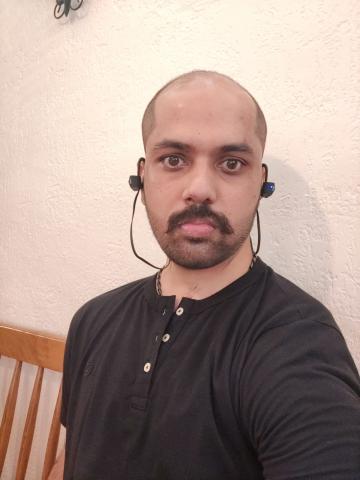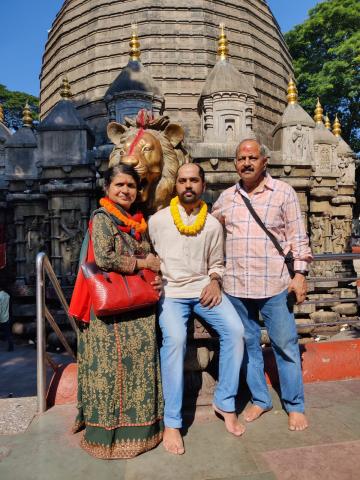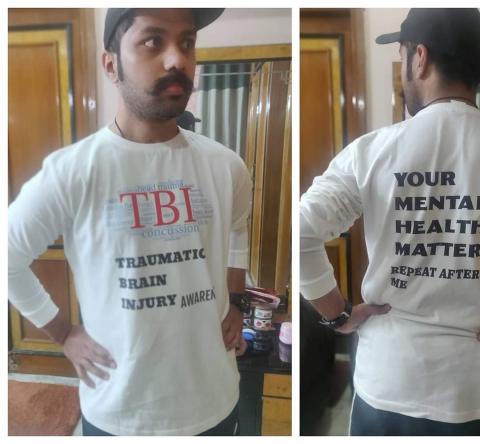
Rohit Gupta, 32, who suffered Traumatic Brain Injury, was in coma for six months with bleak chances of survival. But he defied all odds, recovered miraculously, authored a book, and is helping create awareness about TBI, stigma and social isolation. Read about his inspiring journey.
I suffered a Traumatic Brain Injury (TBI) in April 2011 when I was 21 years old. I was in college studying law and full of dreams for the future, when my life changed overnight…not just for me but for my whole family.
What happened
I was intoxicated after returning from a party in Goa. I was sitting on the parapet of the second floor of my hotel room. It was about 20-25 feet high. Suddenly I fell headlong and was knocked unconscious. I lay unconscious for 3-4 hours until a security guard saw me. I was immediately rushed to a local hospital.
My parents were in Delhi at the time and rushed to Goa. I was in hospital there for a month then I was airlifted to Delhi. I was in a coma for six months after the fall. When I woke up six months after coma, I was shocked and surprised to see myself in a disastrous state, with countless tubes passing through my body. Soon I realised I could not speak a word. I had lost my speech. I could not walk a step. I was collapsing. I had lost my balance too. My optic nerve was paralyzed. I could see only blurred hazy images.

Rehabilitation programme
Within days of gaining consciousness, I was put on various basic therapies and rehabilitation programme. It was a combination of physical, speech and occupational therapy. I had to learn everything from the beginning…how to walk, how to bend my legs, how to open my mouth, how to turn my neck.
Physical Therapy: Physical therapy taught me the fundamentals of walking and balance with help of exercises, treadmills and cycles. The various therapeutic modalities devices helped achieve a range of motions and controlled swelling and pain, heal damaged tissues. I also did yoga therapy to improve body flexibility. Part of physical therapy also included hydrotherapy. I started hydro therapy in 2014-15 at the Indian Spinal Injuries Centre (ISIC). I had to walk in the water for certain duration to build muscle strength. Being an athlete who enjoyed swimming, I loved hydrotherapy.
Speech therapy: Post traumatic brain injury the speech is completely or partially impaired. Unfortunately, I lost my speech completely. I had to learn everything from the beginning, including how to open my mouth, to avoid involuntary drooling. I found this process very draining, much more than physical therapy. I remember using honey to smoothen my tongue movement and flexibility. I also practiced oro-motor exercise, (specialised exercises aimed to improve the strength, control and coordination of the oral muscles like tongue, lips, vocal folds and the jaw), as part of my speech therapy. I would also do balloon and whistle blowing and spirometer for improving lungs capacity.
Occupational therapy includes working on fine movements. It consists of writing, and other activities to further strengthen muscles. I played, and continue to play, various kiddy stuff like marble games with the weak hand or trying to hold thin objects – all for better control over hand movement.
Present condition
This answer can a take a while. Post brain injury one cannot heal fully, or return to their original self. Because a brain injury disrobes the victim or the survivor of everything. It is all about acceptance which is very draining - physically, mentally, emotionally and financially. Similar to the recovery process all these also take a life-time.
Coming back to the question - my current condition does not fall under fully recovered as my balance and speech are still impaired. I can walk independently, but sometimes still fall. My speech is not very clear. I have blurred vision even today. Although, my cognitive ability is intact as I continue to work on them. My motor functions are much better as compared to before. All therapies mentioned above helps me in improving and bettering them.
I'm currently doing occupational therapy and physiotherapy at the Indian Head Injury Foundation (IHIF) as a part of my rehabilitation programme. Traumatic Brain Injury, unlike orthopedic injuries, takes a life time to heal and adjust.
Change in personality
Yes, I have undergone a complete change of personality after the accident. From an outright extrovert and vivacious person, I have become totally withdrawn and an absolute introvert.
I have always spoken about my disability, and continue do it with complete acceptance, both inside and outside. I repeat, conscious acceptance is must when living with trauma. It is not accepting yourself as less, but experiencing strength in what you've overcome.
Living with trauma can be very lonely, because TBI is an evolution which involves both growth and setbacks.

Dealing with depression, anxiety, anger
Post- TBI, I've known these emotions inside out. My book ‘Dawn after Darkness’ was the product of it. The stigma around disability, and that head injury is an invisible. Recovery from TBI is ever lasting, and based on my experience, it can be divided into three phases:
Phase 1 – When I was injured I thought I could easily recover, and slip right back into my old life-style. This phase is majorly governed by denial, immense anger, followed by jolts of depression and anxiety, because of persistent failures and the misery of ‘Why Me’.
Phase 2 - This phase is governed by chronic depression and anxiety that refuses to leave you. But I want to fight back. I haven't given up but the slurred speech, lack of balance and few more hidden disabilities are part of my long recovery process. I'm living it, and finding peace in that.
Phase 3 - Lack of friends, absence of a social circle and companionship leaves you in a dark place. Maybe, it is also a reason behind my slow progress and relapse sometimes. It is important to deal with the emotions positively, although it's not possible to remain positive always, but I have to constantly remind myself of what I have, now.
Thanks to support of my parents and dialogues with the self that has saved me from falling into the endless abyss. This is the reason I regularly talk about my TBI, abilities/disabilities and want to form a support group to reach out to other TBI-survivors in the long process of rehabilitation.
The thought of committing suicide has crossed my mind at various points, but I have stopped myself. I have called the suicide helpline many times. Then reasoned with myself that I am strong and can get through this difficult moment. I think of my family, who are happy seeing me breathing everyday, and trying to live.
Current interest/hobbies
Today, my main interest are reading, writing, creating awareness videos, and to willingly indulge in my rehabilitation process.
Yes, I've written the book 'Dawn After Darkness', published on 11 June, 2018 with the support and guidance of my parents and Indian Head Injury Foundation (IHIF), Delhi. The book depicts my journey and parts of my recovery from TBI with IHIF. My journey of writing the book started with blogging, which was well received by people, encouraging me to moving towards writing my book.
Read Shivani's review of the book here
Around the same time, I started my YouTube channel as well. All these activities were focused on removing the stigma surrounding brain injury, raising awareness and fighting loneliness.
It is often said trauma and creativity are inter-related bringing forth the deepest emotions. As mentioned before, trauma puts a person in a dark place, and creativity assisted me in dealing with it positively and courageously without giving up or giving in.
Slurred speech, loss of balance and absence of friends put me into a shell, and creativity helped me decorate it with my own colors. It was the graffiti on the walls of my solitude. It was my gratitude towards everything I over-came, and the support I received.
Including the above mentioned issues, short term memory issues post-TBI have been tough to deal with, but acknowledging them gives me strength in embracing them, and working on them.
Untiring family support
My parents have been my rock solid anchor and my real support from the beginning. They have stood by me instilling hope and optimism every single day and providing me with best medical facilities, and they continue to do so till date. They are my foremost caregivers. I'm not denying the importance of friends, but the way family handles and deals with adversity friends cannot.
By God’s grace, we stumbled upon Indian Head Injury Foundation website. From there, the unceasing support of my family and their team guided me forward. They have the best rehabilitation equipment, team and support playing a very crucial role in recovery from TBI.
Creativity on the other hand is my vent out, both negative and positive as everything cannot be discussed with parents. I was never an introvert but now I enjoy it more. Going for coffee or movies alone which I never did before my accident.
I'm not an active blogger. I use it as a medium pour out the fumes/anger burning inside me due to the limitation. It helps me reach people, to create awareness about TBI.
Second Book
The second book deals with disability as a whole. Yes, it does involve the protagonist suffering from TBI, but there is more to it. It is a love story with two mythological stories adding more meaning to it. It is fiction.
Motivation
I remember, my mother telling me that the doctor said that I'd only 5% survival chances. If I survive I would be in a vegetative state for life. By God's grace, my parent’s blessings and some of my athleticism helped me survive, and pull through. I still stumble while walking, my speech sometimes is still incomprehensible and I have other limitations, but thanks to being a sportsman as a kid or the untiring motivation of people around me, and continuous support IHIF - with the ‘let's try again attitude’...I move forward everyday.
At the end I would like to say - it is ok to be not ok.

Excerpt from Dawn After Darkness by Rohit Gupta
All love has an expiry date – except mother love. It’s not that mother keeps you hidden from reality but she is able to put things in a comforting way. She has to balance her love between all family members as they are all equal from her point of view, and sometimes a harshness in her voice may hurt you, but she is only trying to balance her selfless love. No one can actually understand your pain, shallowness, inferiority and depression but my mother’s aim is to make me, the survivor and victim, realize the importance of keeping on trying and following the prescribed path of betterment. (Even she sometimes fails to realise the misery of my life however, because dependency sometimes extend too far.)






